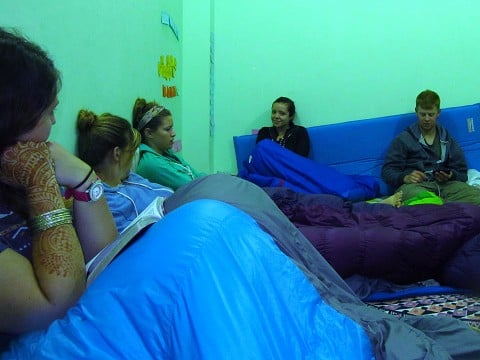The Myers-Briggs and leadership
At Epoch, Bob Goff brought up the point that we should love our enemies. He started a school for his enemies – the witch doctors of Uganda. It got me thinking about my enemies and what I’m doing for them. I thought back to one particular enemy I did not interact well with.
Before I went on the World Race six years ago, I asked myself a question.
If I could choose five friends to go around the world with for a year, who would they be?
“Nobody!” I answered myself.
 I was pretty sure there’d be plenty of drama, everyone would be difficult to get along with and that I would be misunderstood frequently. So, I went into the Adventures office and asked the staff for the Myers-Briggs results for each person on my squad. Then I bought two Please Understand Me books – one for myself and one for the person on the squad that I really didn’t get along with.
I was pretty sure there’d be plenty of drama, everyone would be difficult to get along with and that I would be misunderstood frequently. So, I went into the Adventures office and asked the staff for the Myers-Briggs results for each person on my squad. Then I bought two Please Understand Me books – one for myself and one for the person on the squad that I really didn’t get along with.
After looking thru the results of each person, the first thing I noticed was that I was one of only two “thinkers” and that nobody else shared my personality type.
“This is gonna suck…” I thought to myself.
At training camp I picked out who I figured I might struggle with most. At the end of training camp I found out we were on the same team. Two weeks into the trip we were arguing about the ethics of downloading music online and Barry Sanders’ skin color.
On travel days her curling iron and hair dryer dangled and clanked around on the outside of her enormous pack. She put on makeup every day, made ditzy comments and was just NOT a good missionary. She was also 32 and I was 22.
I read her Myers-Briggs results in my Please Understand Me book about every week and just lived with the internal struggle. But we didn’t do feedback back then, so it really was all internal. Plus, she didn’t want my other copy of the book, so it was hopeless.
Then I became the team leader and my nemesis gave me scornful looks and I was passive aggressive. I didn’t know how to understand her! And what’s worse, we never talked about it on the whole Race. We left being misunderstood; both of us just thought we’d never get along that that was fine.
I learned a few lessons thru this whole experience:
1. Women may cry if I insist too abrasively that Barry Sanders is black
In other words, feeling understood is more important than being right.
2. People aren’t inherently bad… they just think differently
I wonder what would have happened if I’d spent the time to listen more, validate feelings and value strengths.
3. The strength of the team is lessened by my inability to get along with them
The job of a leader is to uncover the best in others, help them believe in themselves and give them opportunities to practice and grace to fail.
Who do you not understand and what efforts are you doing to build a relationship with them?
Who are your enemies and what are you doing to love them?
